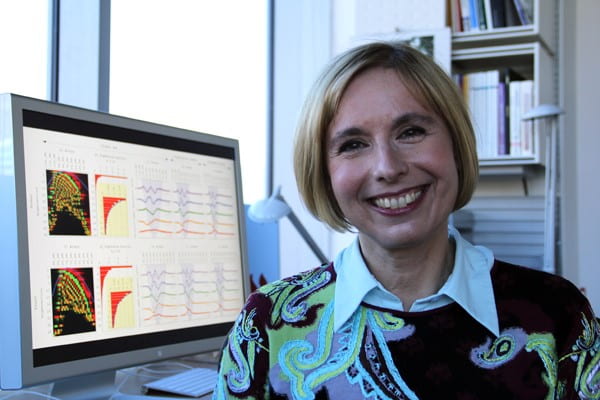T32 Seminar
Orly Alter, PhD
Associate Professor, Biomedical Engineering
Adjunct Associate Professor, Human Genetics
USTAR Associate Professor, Scientific Computing and Imaging (SCI) Institute Investigator
The University of Utah
Wednesday, June 5 | 4:00 pm
Ryan 4003
Refreshments will be served at 3:45 pm

Abstract:
Multi-Tensor Decompositions for Personalized Cancer Diagnostics and Prognostics
Professor Alter will describe the use of novel, multi-tensor generalizations of the singular value decomposition in the comparisons of brain, lung, ovarian, and uterine cancer and normal genomes, to uncover patterns of DNA copy-number alterations that predict survival and response to treatment, statistically better than, and independent of the best indicators in clinical use, and existing laboratory tests. Recurring alterations have been recognized as a hallmark of cancer for over a century, and observed in these cancers’ genomes for decades; however, copy-number subtypes predictive of patients’ outcomes were not identified before. The data had been publicly available, but the patterns remained unknown until the data were modeled by using the multi-tensor decompositions, illustrating the universal ability of these decompositions – generalizations of the frameworks that underlie the theoretical description of the physical world – to find what other methods miss.
Biography:
Orly Alter is a USTAR associate professor of bioengineering and human genetics at the Scientific Computing and Imaging Institute and the Huntsman Cancer Institute at the University of Utah, and the principal investigator of an NCI Physical Sciences in Oncology U01 project grant. Inventor of the “eigengene,” she pioneered the matrix and tensor modeling of large-scale molecular biological data, which, as she demonstrated, can be used to correctly predict previously unknown physical, cellular, and evolutionary mechanisms. Alter received her Ph.D. in applied physics at Stanford University, and her B.Sc. magna cum laude in physics at Tel Aviv University. Her Ph.D. thesis on “Quantum Measurement of a Single System,” which was published by Wiley-Interscience as a book, is recognized today as crucial to the field of gravitational wave detection.
Sponsored by the Chicago Region Physical Sciences-Oncology Center NCI U54CA193419